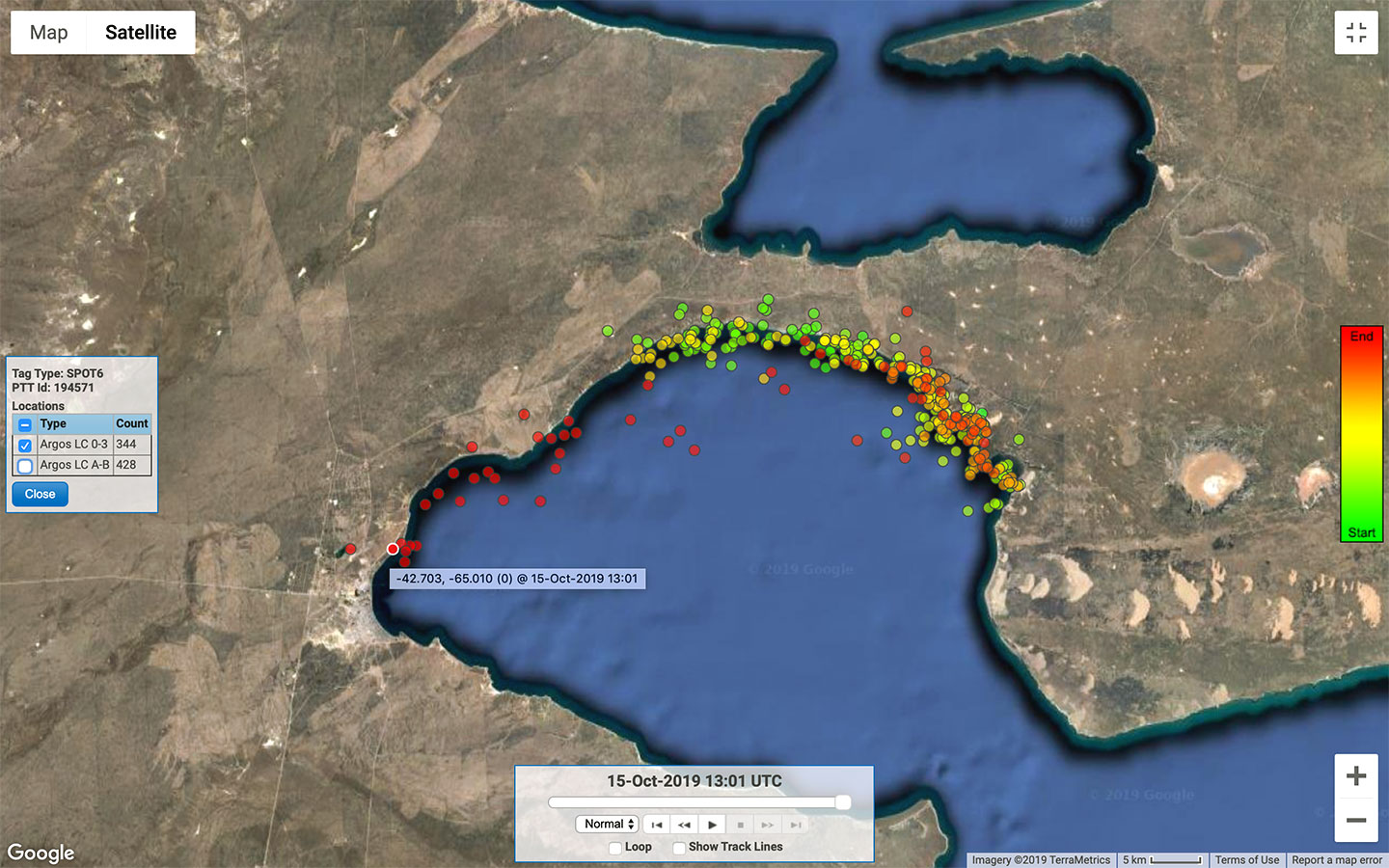Photo: N. Lewin
Afuerita’s 211 day tracking route (18,356 km)
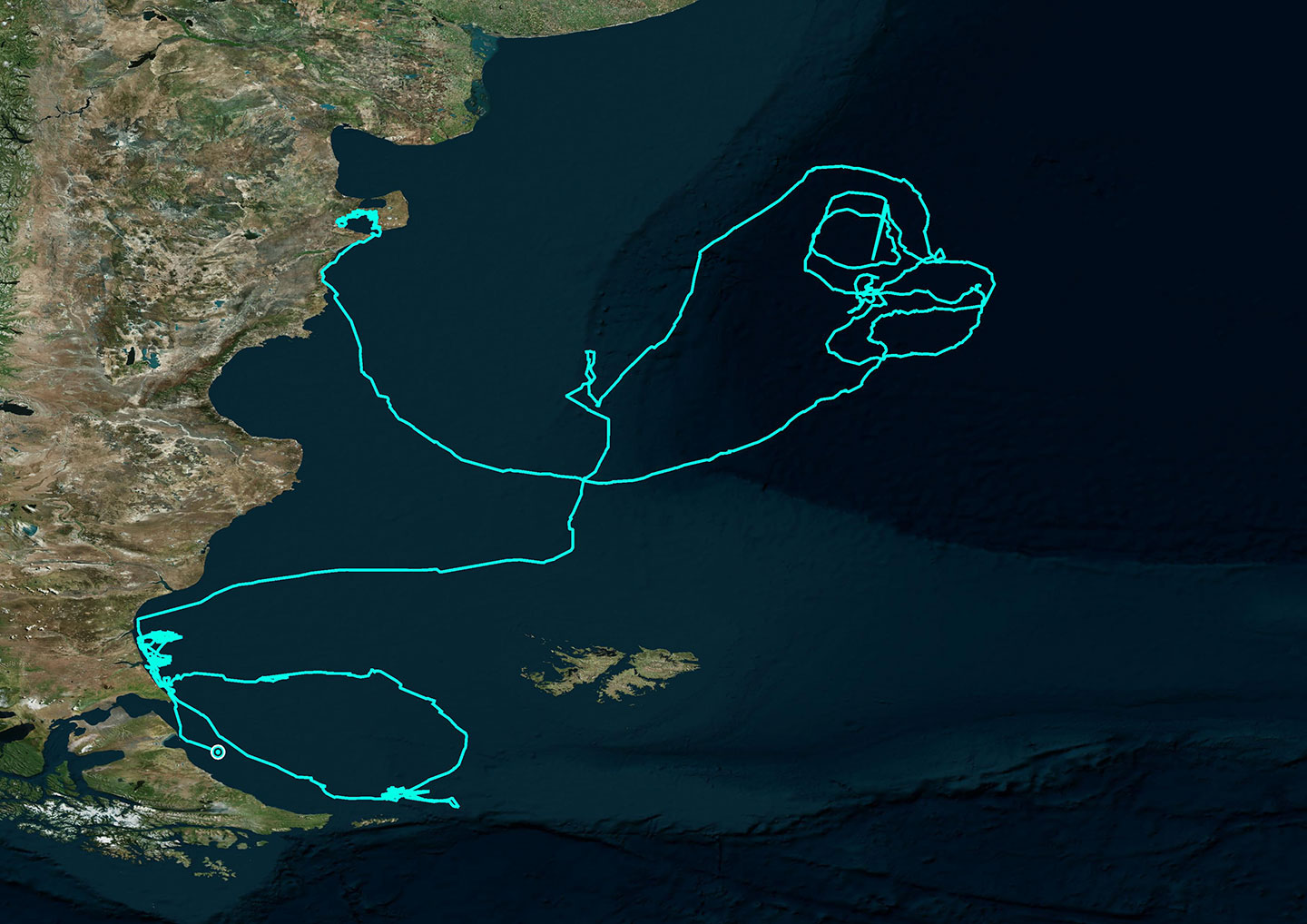
April 07 – April 13, 2020
After scarcely moving for weeks, Afuerita began traveling south hugging the coasts of both Santa Cruz and Tierra del Fuego provinces, ignoring the oceanic current through the Straits of Magellan. This mother and calf covered the same route between the end if January and the first part of February, when they swam close to the eastern shore of Tierra del Fuego to an area north of Isla de Los Estados (Staten Island), where they remained feeding for a few days. Could this once more be their destination? We will never know… today, after being tracked for 211 days, and with 16,328 kilometers traveled, Afuerita’s tag stopped transmitting.
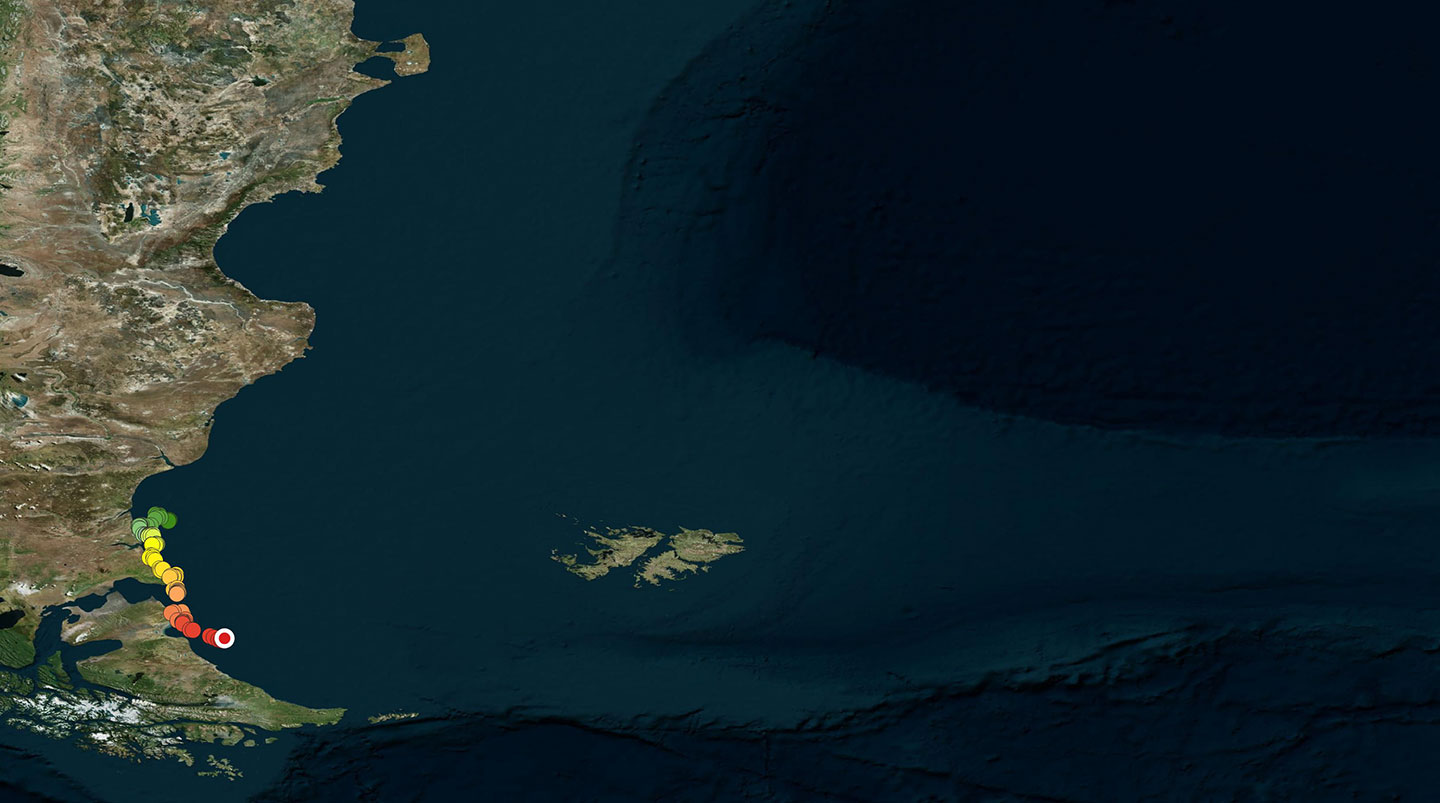
March 31 – April 06, 2020
Afuerita and her calf have remained in the same position close to the southern coast of Santa Cruz province for more than a month. The Bahia Grande area seems to offer an abundance of food for these whales, which have not yet begun their return trip to the north Patagonian gulfs.
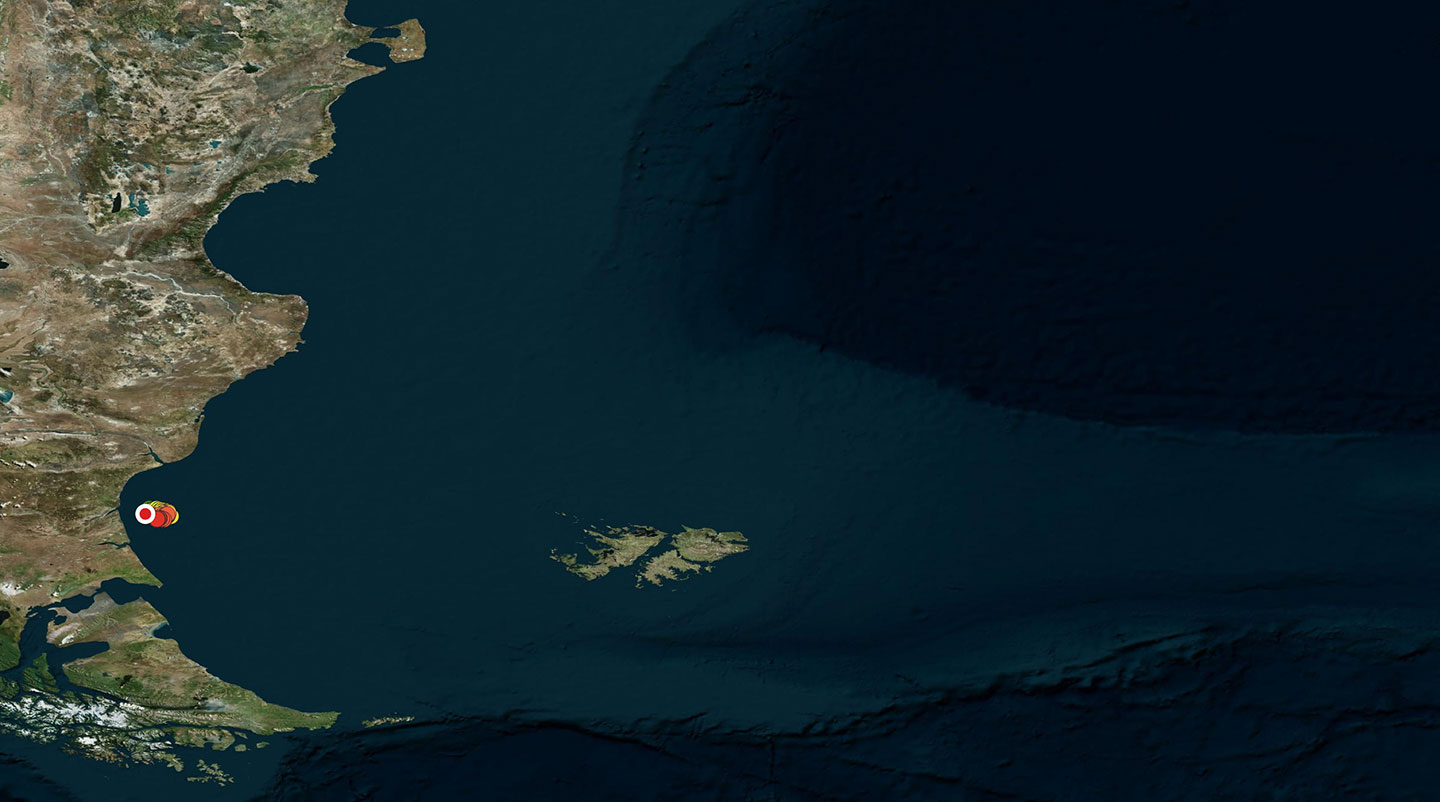
March 24 – March 30, 2020
Afuerita has been exploring the southern coast of Santa Cruz province since the last days of February. Last week, mother and calf remained in the Bahia Grande (Big Bay) within a 1,500 square kilometer area.
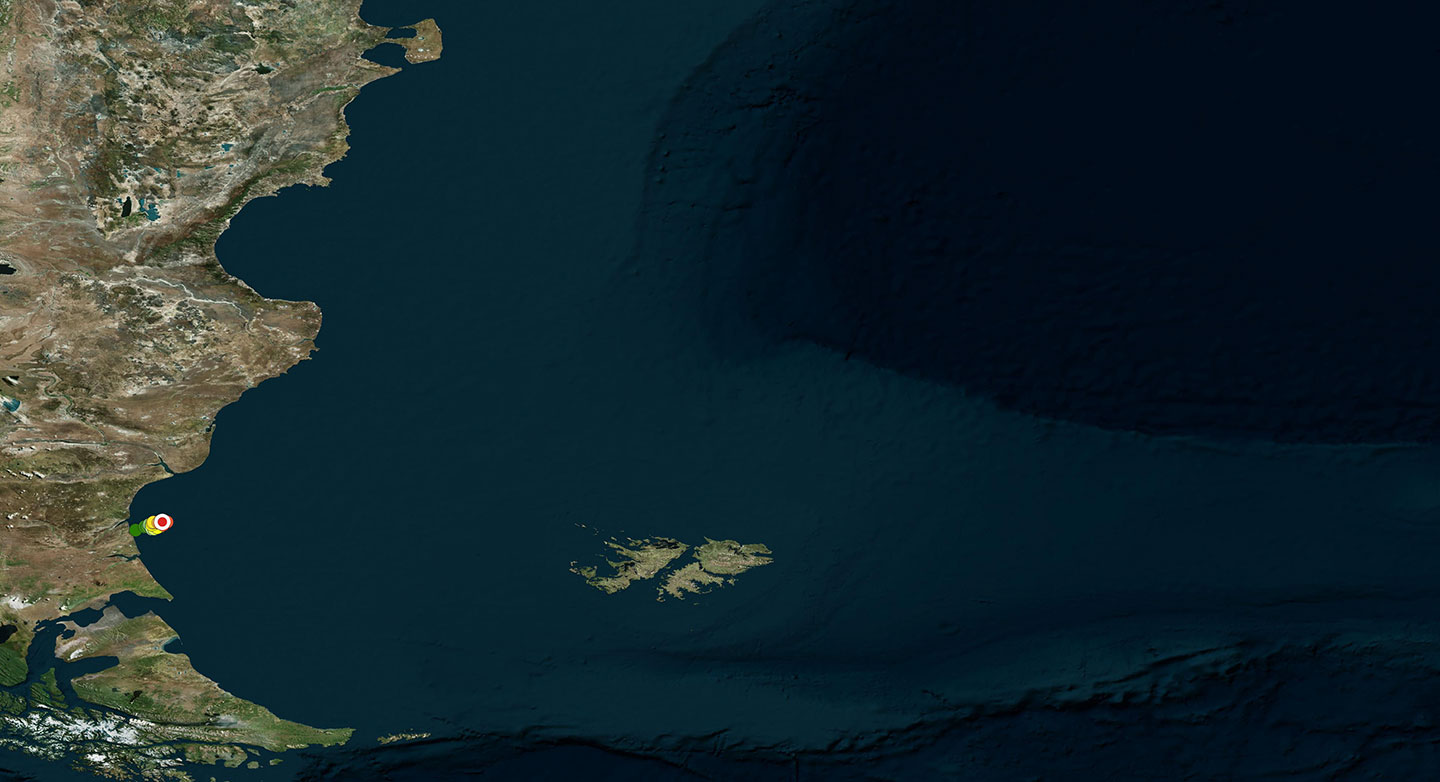
March 17 – March 23, 2020
Afuerita and her calf have continued feeding close to the southern coast of Santa Cruz province during the entire month of March. They will soon begin traveling north to the gulfs of Peninsula Valdés, where the calf, approaching one year of age, will be weaned from its mother.
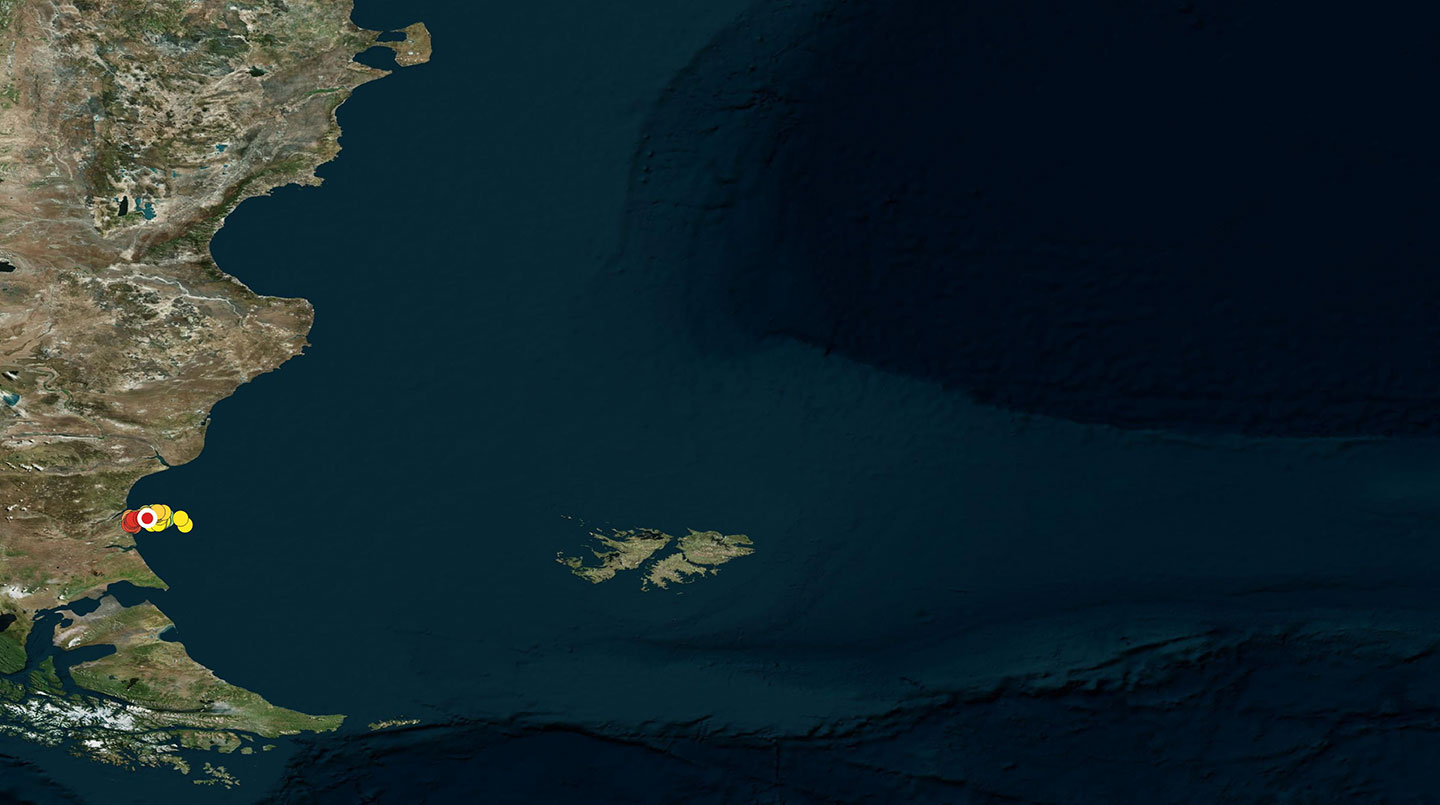
March 11 – March 16, 2020
Afuerita and her calf have remained very close to the continent at the mouth of Rio Gallegos (the Gallegos River). In the last few days they have begun traveling slowly northwards.
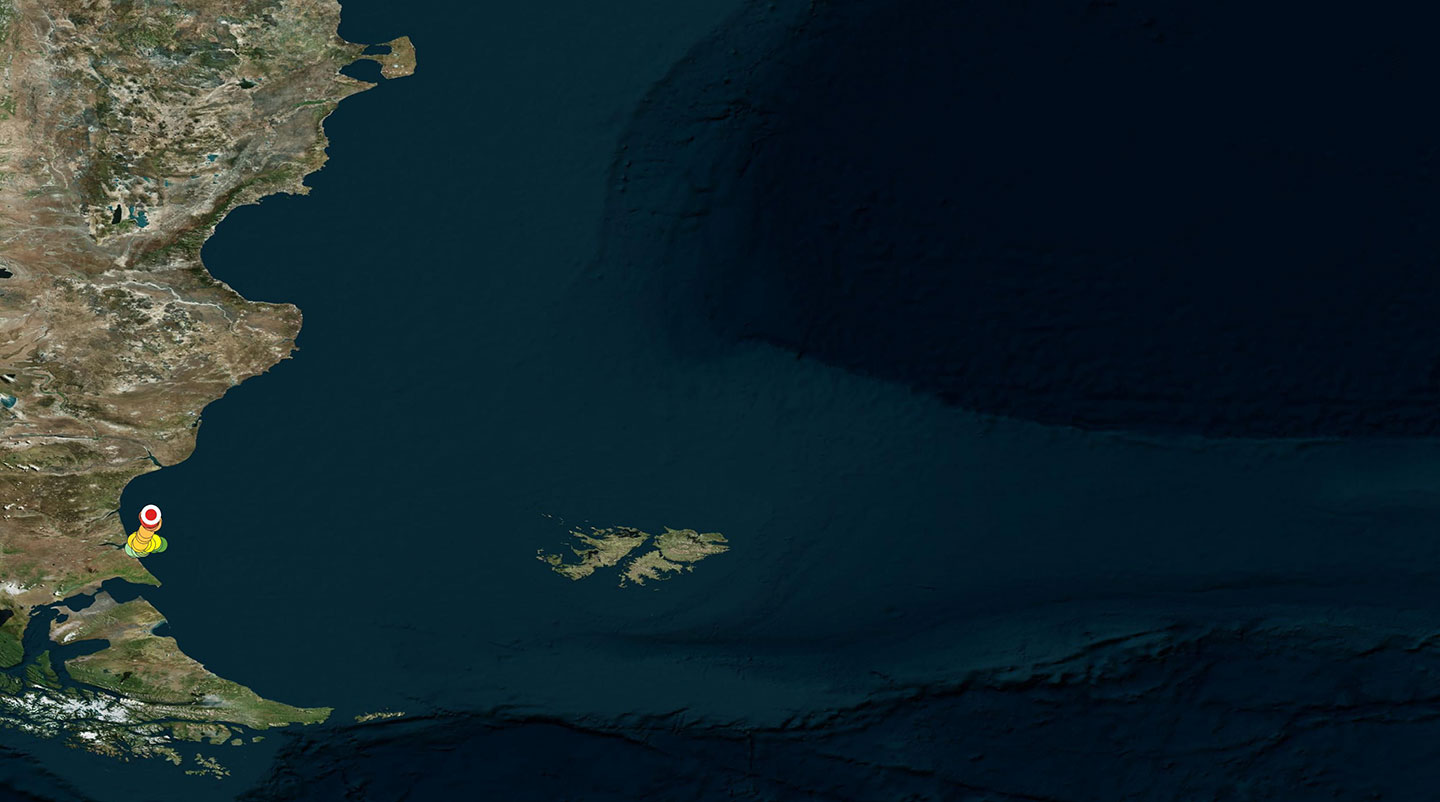
March 04 – March 10, 2020
Afuerita and her calf continue feeding very close to the southern coast of Santa Cruz province, just 30 kilometers from the mouth of the Gallegos River (Rio Gallegos). This zone of the continental shelf, under both provincial and national jurisdiction, is part of the Cuenca Austral Marina (Southern Marine Basin) and is of interest for exploitation of oil and gas. In this context, knowing that the whales use this area with abundant food, is very relevant.

February 25 – March 03, 2020
Afuerita continued traveling west, coming extremely close to the continent, approximately 10 kilometers away from the coast of Santa Cruz province and Cape Virgins. The circulation of water from the Pacific to the Atlantic Ocean through the Straits of Magellan supplies abundant nutrients to this far south zone of the continental shelf.

February 19 – February 24, 2020
Mother and calf began their week southeast of the Malvinas (Falkland) Islands, then swam westwards over the far south of the continental shelf. Today they are 150 kilometers from Punta Dungeness, which is on the eastern mouth of the Straits of Magellan, which connects the Atlantic and Pacific Oceans.

February 11 – February 18, 2020
Afuerita and her calf are now traveling northwards after feeding for a few days north of Staten Island and in the area of the Namuncurá/Burdwood Bank. They are now over the far southern section of the continental shelf, closer to the Malvinas (Falkland) Islands than to the continent.

February 07 – February 10, 2020
Afuerita and her calf continued traveling south along the eastern coast of Tierra del Fuego, crossed the northern part of the Le Maire Strait and are now feeding 40 kilometers from the Isla de los Estados (Staten Island).

January 29 – February 06, 2020
Afuerita and her calf continued their westward travels until they reached the coasts of Santa Cruz province. Then they headed south tracing the coastline and are currently at the easternmost tip of Tierra del Fuego Island.

January 21 – January 28, 2020
At the beginning of the week Afuerita and her calf were over the edge of the continental slope. From there they traveled south towards the Malvinas (Falkland) Islands, then swam west to a point halfway between the South American continent and the islands at the latitude of Puerto Santa Cruz. They are 150 kilometers north of the adult male “69”.

January 12 – January 20, 2020
After spending a week at the latitude of Golfo San Jorge, Afuerita and her calf traveled slowly southwards, exploring the edge of the continental slope.

January 06 – January 11, 2020
Afuerita and her calf continued traveling south this week, swimming almost 300 kilometers to the latitude of Golfo San Jorge. This area of the continental slope next to the Blue Hole has been used extensively by the whales tagged this season.

December 29, 2019 – January 05, 2020
Afuerita and her calf swam towards the northwest until they reached the continental slope which they then followed southwards to an area north of the Blue Hole.

December 22 – December 28, 2019
Afuerita lost interest in the area where she had been feeding and swam with her calf 200 kilometers to the northeast. Now they are exploring a new section of the deep ocean basin at the approximate latitude of Golfo Nuevo.

December 16 – December 21, 2019
During this past week, Afuerita and her calf have remained within an area of 5,400 square kilometers. There is an abundance of chlorophyll in these waters, which indicates that there is abundant food for whales.

December 05 – December 15, 2019
Afuerita and her calf are once more swimming in a circular pattern, this time in a clockwise direction. We think she must be feeding, following the whirlpools which are formed on the edges of the highly productive Malvinas (Falkland) current that moves in a northward direction.

November 26 – December 04, 2019
After swimming in circles for awhile, Afuerita and her calf traveled 260 kilometers eastward. These past two days they have remained almost stationary in the same area of the oceanic basin, probably feeding.

November 17 – November 25, 2019
Afuerita and her calf swam an almost perfect circle route, 175 kilometers in diameter, in the same general area. One of the whales with a transmitter attached in 2014, Buena Onda, traveled a similar route during her travels. By coincidence, a circular current or “eddy” was detected in this area last week. It seems that the whales take advantage of these water swirls, which carry large amounts of nutrients, by feeding in them.

November 10 – November 16, 2019
During this week Afuerita and her calf traveled north in the open ocean swimming in an inverted “S” pattern. At present they are at the latitude of Golfo Nuevo, 950 kilometers from the coast.
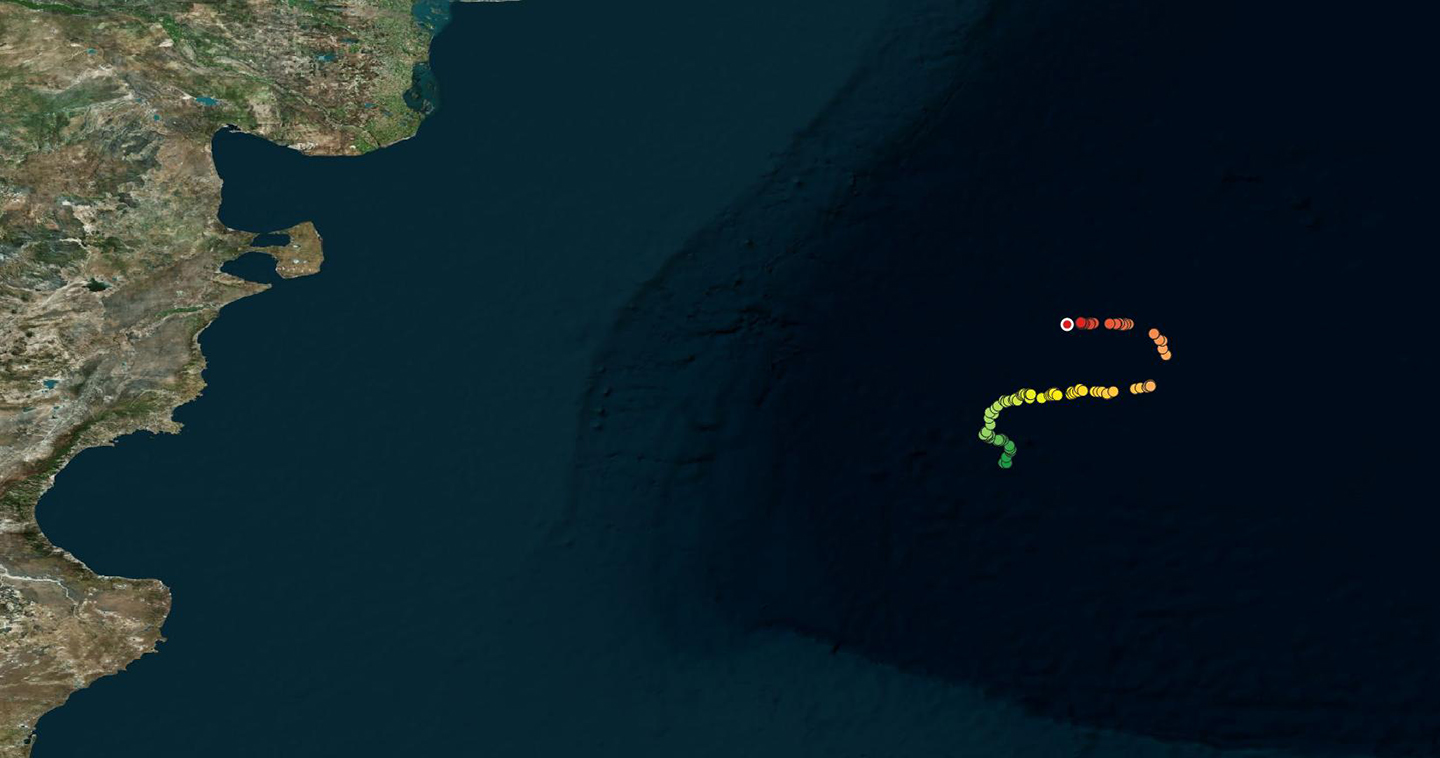
November 2 – November 9, 2019
From her last position Afuerita and her calf traveled 800 kilometers in one week, reaching the South Atlantic ocean basin close to the area where Pulgarcita was when her transmitter ceased transmitting.

October 27 – November 1, 2019
A week ago this mother and her calf left Golfo Nuevo. Afuerita traveled down the coast to the latitude of Punta Tombo and then swam away from the coast towards the southeast and the open ocean. In three days she and her calf traveled 300 kilometers at a constant speed against the strong Malvinas (Falkland) current. They are now 250 kilometers to the east of Puerto Deseado.
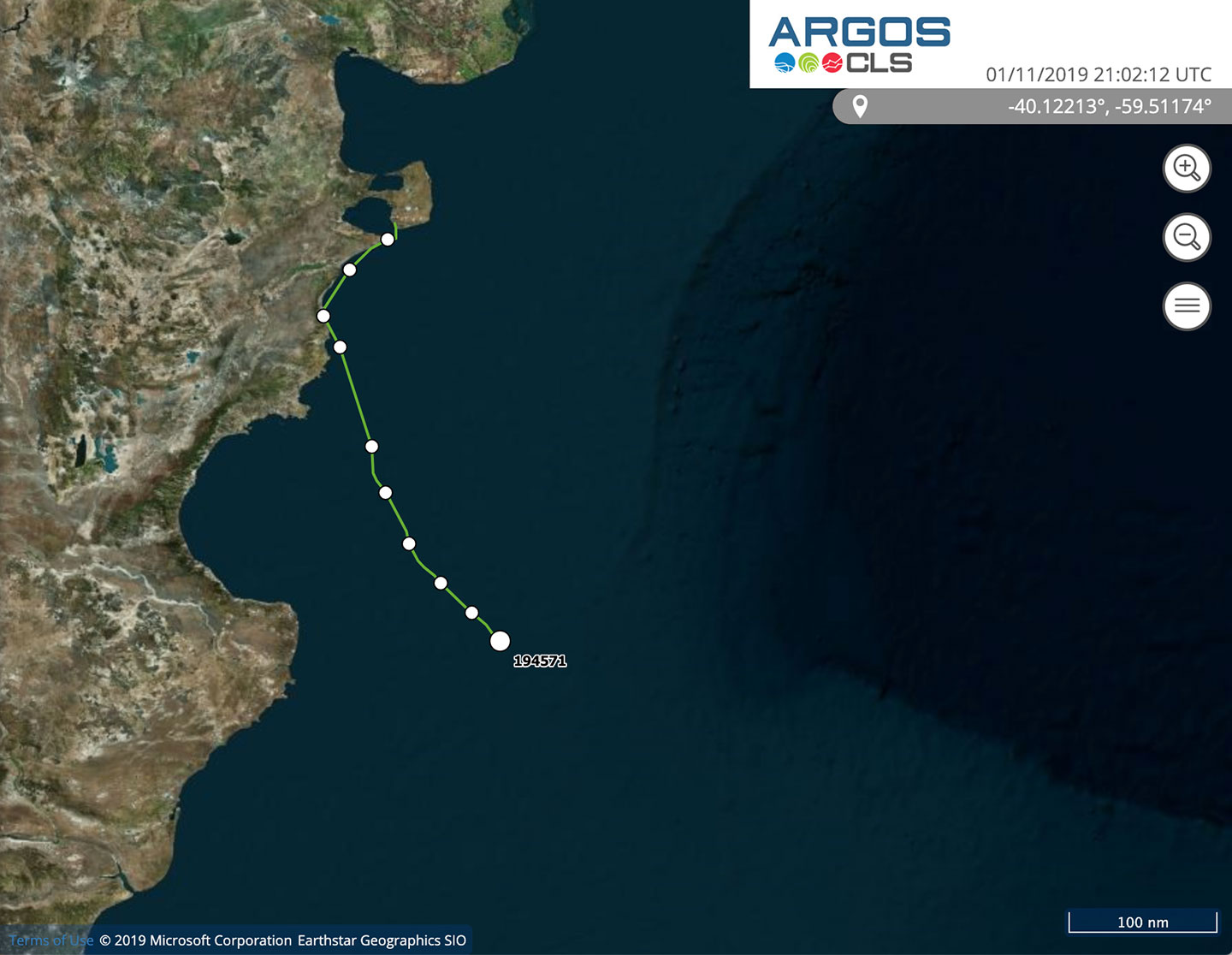
October 16 – October 26, 2019
Afuerita and her calf continue swimming along the northern coast of Golfo Nuevo, between El Doradillo and Morro Nuevo. The majority of the adult males have already left the waters surrounding the Valdes Peninsula, and thus a more tranquil period has begun for the mothers and their calves.
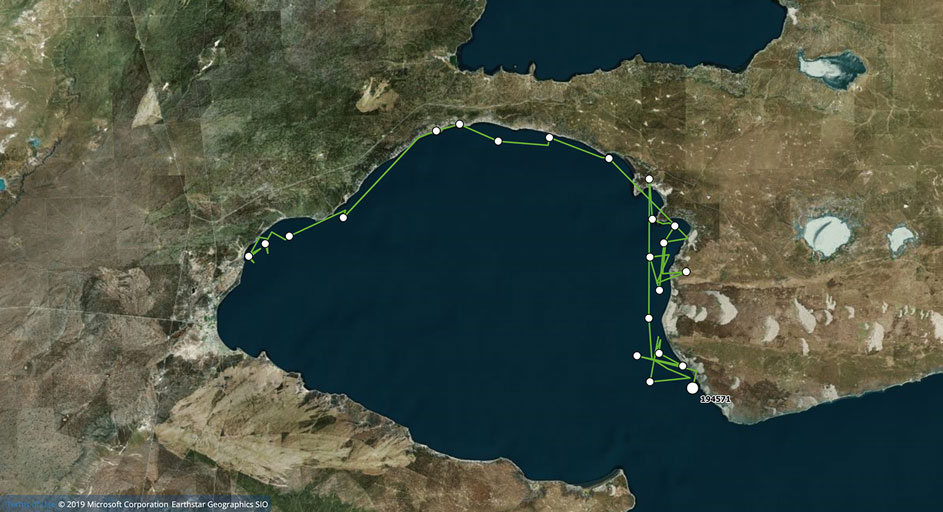
September 14 – October 15, 2019
Afuerita, an adult female to whom a satellite transmitter was attached on September 14, has been swimming close to the north coast of Golfo Nuevo accompanied by her calf. Her latest recorded positions (in red) are close to Puerto Madryn. In spring the mothers spend most of their time swimming slowly in the shallow waters of the north Patagonian gulfs, protected from the storms of the open ocean.
